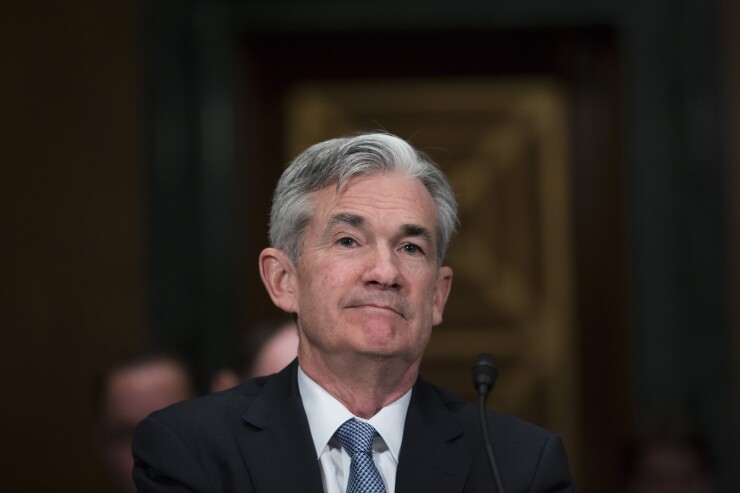Want unlimited access to top ideas and insights?
Federal Reserve Board Chairman Jerome Powell again pledged the central bank “will act as appropriate to sustain the expansion,” saying there were “no recent precedents to guide” policy decisions. Markets were relieved he didn't rule out cuts, but disappointed he didn't suggest more were coming.
Three factors threaten the “favorable” economic outlook, according to Powell: “slowing global growth, trade policy uncertainty, and muted inflation.”
The trade situation and the uncertainty it causes has “a role in the global slowdown and in weak manufacturing and capital spending” in this country.
“[W]hile monetary policy is a powerful tool that works to support consumer spending, business investment, and public confidence, it cannot provide a settled rulebook for international trade,” Powell said in prepared text of a speech in Jackson Hole, released by the Fed.

Because monetary policy works with a lag of at least a year, he said, policymakers “must attempt to look through what may be passing developments and focus on things that seem likely to affect the outlook over time or that pose a material risk of doing so.”
Risk management becomes a part of policymaking and “at times [it will] be appropriate for us to tilt policy one way or the other because of prominent risks.”
Powell said: “In principle, anything that affects the outlook for employment and inflation could also affect the appropriate stance of monetary policy, and that could include uncertainty about trade policy.”
Policymakers “are carefully watching developments as we assess their implications for the U.S. outlook and the path of monetary policy,” he said, calling the past three weeks “eventful.” He pointed to new tariffs announced on imports from China, “further evidence of a global slowdown, notably in Germany and China,” and “geopolitical events” including Brexit concerns, “tensions in Hong Kong, and the dissolution of the Italian government.”
Mickey Levy, Berenberg Capital Markets Chief Economist U.S., Americas and Asia, said Powell's comments indicated "that the Fed would see it as appropriate to lower rates further if it perceived the need to reduce the probability of recession, without providing any indication of the timing of a policy change,”
Bond yields dipped after the speech, according to Bryce Doty, senior vice president/senior portfolio manager at Sit Fixed Income. “The fear was that Powell would indicate that the Fed would not lower rates,” which, he didn’t. “We expect the fed to cut a quarter point at their next meeting, September 18th, and skip October but then cut another quarter point in December,” unless there is an unexpected breakthrough on trade.
"While the sharp decline in real yields and inverted curve might justify pricing in rate cuts, strength in economic fundamentals argue for higher yields," according to a report co-authored by Subadra Rajappa, Societe Generale's head of U.S. rates strategy. "We are neutral on duration but favour positioning for higher yields/steeper curves via options."
Jack McIntyre, portfolio manager at Brandywine Global, saw "positive connotations" for the market in Powell's comments. "President Trump's tweets could lead us into a recession," but Powell's speech "sent a message to Trump saying monetary policy isn't an effective tool in this current market environment."
The Fed chair steered clear of references to "insurance cuts or mid-cycle adjustments," phrases that had raised concern in the markets that were "pricing in a more extended rate cutting cycle" that might not be coming.
Fed presidents
Federal Reserve Bank of Cleveland President Loretta Mester said on CNBC her preference is “probably” to hold rates for now, although she has an “open mind” about downside risks making lower rates necessary.
Meanwhile, Federal Reserve Bank of Dallas President Robert Kaplan, said on Bloomberg Television: “Even though I am open to an adjustment either in September or the next few meetings, I prefer not to have to make an adjustment.”
Lower rates would spur risk taking, he said.
“The fulcrum or center of gravity of U.S. economic today policy is not monetary policy. It is trade uncertainty, it is probably immigration policy to some extent, it is policies that relate to improved skills training, infrastructure spending,” Kaplan added.
Federal Reserve Bank of St. Louis President James Bullard said Friday he expects “robust debate” at the next FOMC meeting about a 50 basis point cut, “but obviously the markets have a base case of 25 basis points.”
Housing
New home sales plunged 12.8% to a seasonally adjusted 635,000 annual rate in July, the U.S. Commerce Department reported Friday.
Economists polled by IFR Markets expected 647,000 sales in the month.
The June level was revised up to 728,000 from the 646,000 first reported.
NAR Chief Economist Lawrence Yun said despite the drop, “the year-to-date figures show that newly constructed home sales are up 4%.” The data don’t necessarily reflect a weakness in demand, but rather a shortage of supply. “Single-family housing starts this year are lower by 3%,” he said. “Demand is clearly there; supply not.”





